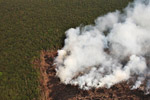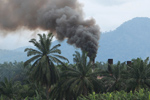Aceh governor Irwandi Yusuf may have broken Indonesia’s moratorium on new concessions in peatlands when he approved an oil palm plantation in the Tripa peat swamp in August this year, alleges WALHI, an Indonesian environmental group.
WALHI says Governor Irwandi granted a permit to palm oil company PT Kallista Alam to convert 1,605 hectares of peat forest in Nagan Raya District into an oil palm plantation. The approval appears to violate a presidential instruction issued earlier this year banning new concessions in primary forests and peatlands.
WALHI is now suing the governor in Aceh’s administrative court. It says the governor could face up to 5 years in prison under Indonesian law.
But WAHLI also suggests that Iwardi may not be fully culpable in the case.
“Provincial government sources have stated that this ‘uncharacteristic’ signing of the approval document, dated August 25th, suggests he was either ‘very pressured to sign it’, or simply ‘may not have been fully aware of what he was signing’,” said WALHI Spokeperson TM Zulfiker in a statement.
Governor Irwandi has become renowned for his efforts to save Aceh’s forests and is recognized as a leader in the Governors’ Climate and Forests Task Force, which is setting up a mechanism for industrialized countries to fund forest conservation programs in tropical countries.
Given Iwardi’s prominent forest conservation efforts, John O. Niles, Director of the Tropical Forest Group, a forest policy NGO based in the U.S., said judgement should be withheld until all the facts are in on the case.
“This is a serious allegation, but Irwandi has demonstrated his strong personal commitment to the people and forests of Aceh,” said Niles, who has worked for governor Irwandi’s office on REDD. “Let’s wait till we see the facts and hear from the Governors’ office before leaping to any judgments”.
Aceh is among the most forested provinces in Sumatra, which has suffered widespread forest loss for oil palm estates and pulp and paper plantations.
Related articles
Indonesia’s new forest moratorium map improved, say experts
(07/13/2011) The latest version of Indonesia’s forest moratorium map is much improved over its predecessor, say forestry analysts from Daemeter Consulting.
Is the Ministry of Forestry undermining Indonesia’s logging moratorium?

(06/28/2011) Indonesia’s Ministry of Forestry is already undermining the moratorium on new forestry concessions on peatlands and in primary forest areas, alleges a new report from Greenomics-Indonesia. The report, The Toothless Moratorium, claims that a new decree from the Ministry of Forestry converts 81,490 hectares of forest protected under the moratorium into logging areas. The area affected is larger than Singapore.
(06/17/2011) World Resource Institute’s summary of key elements, and unanswered questions, in Indonesia’s recent moratorium on new forest permits.
Will Indonesia’s big REDD rainforest deal work?

(12/28/2010) Flying in a plane over the Indonesian half of the island of New Guinea, rainforest stretches like a sea of green, broken only by rugged mountain ranges and winding rivers. The broccoli-like canopy shows little sign of human influence. But as you near Jayapura, the provincial capital of Papua, the tree cover becomes patchier—a sign of logging—and red scars from mining appear before giving way to the monotonous dark green of oil palm plantations and finally grasslands and urban areas. The scene is not unique to Indonesian New Guinea; it has been repeated across the world’s largest archipelago for decades, partly a consequence of agricultural expansion by small farmers, but increasingly a product of extractive industries, especially the logging, plantation, and mining sectors. Papua, in fact, is Indonesia’s last frontier and therefore represents two diverging options for the country’s development path: continued deforestation and degradation of forests under a business-as-usual approach or a shift toward a fundamentally different and unproven model based on greater transparency and careful stewardship of its forest resources.
Aceh, Papua, Amazonas governors sign carbon-for-forests pact
(12/08/2007) Three governors have signed the Forests Now Declaration to protect tropical forests for their carbon value. The Governors, Irwandi Yusuf (Aceh, Indonesia), Barnabas Suebu (Papua, Indonesia), and Eduardo Braga (Amazonas, Brazil), agreed to the declaration’s action plan which calls for compensation for reduced greenhouse gas emissions from deforestation and protection of standing forests. Deforestation and forest degradation account for roughly 20 percent of human-caused greenhouse gas emissions, but steps to reduce forest loss will help mitigate climate change. The UK government’s 2005 Stern Review said that forest protection could be one of the most cost-effective ways to address climate change.
Carbon for forests will help Aceh recover from war, tsunami
(09/18/2007) Carbon credits through forest conservation will play an important role in Aceh’s recovery from decades of civil war and the devastating 2004 tsunami, which left more than 167,000 people dead and 500,000 homeless in the Indonesia province, said Aceh governor Irwandi Jusuf in meeting in San Francisco.







